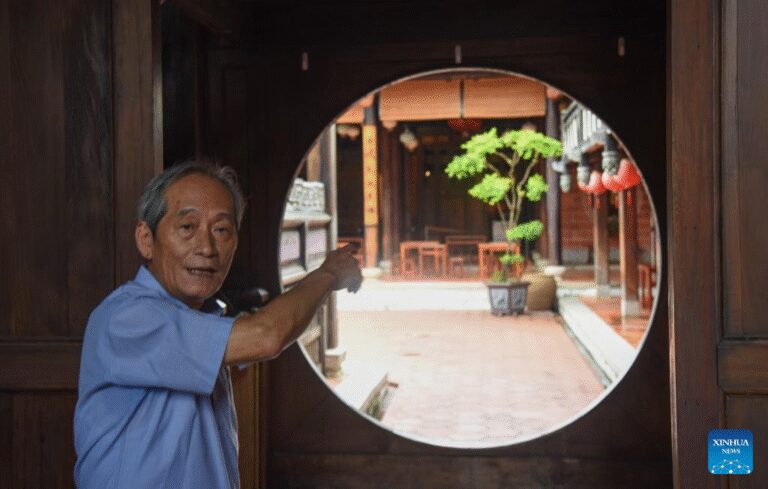
Lin Kuang-hui, a ninth-generation descendant of the Lin family and a founding member of the association for relatives of patriots in Taiwan who fought against Japanese occupation, speaks during an interview with Xinhua, at the Lin family’s old mansion in Wufeng, Taichung City, southeast China’s Taiwan, June 3, 2025.(Xinhua/Li Jianhua)
TAIPEI, Aug. 24 (Xinhua) — In central Taiwan, an old mansion with stunning traditional Chinese architecture stands as a silent witness, inviting visitors to discover the story of its owners’ steadfast resistance against Japanese aggression and colonial rule for half a century.
Located in Wufeng, Taichung City, the compound is now Taiwan’s largest ancient building complex to have been preserved intact. It also stands as a testament to the Lin family’s enduring resistance against foreign aggression and their unwavering patriotism.
“Japanese colonial rule lasted for 50 years, so did my family’s resistance,” said Lin Kuang-hui, a ninth-generation descendant of the family.
Lin Kuang-hui remembered his grandfather, Lin Tsu-mi, often saying, “A family thrives only when the nation thrives, and to truly love one’s family, one must first cherish the motherland.”
Carrying forward this devotion to the motherland through generations, the remarkable story of this prominent family continues to resonate today.
The Lin family settled in Taiwan after their ancestor sailed from Fujian, just across the Taiwan Strait on the mainland, in 1746.
In 1894, Japan launched the invasive Sino-Japanese War of 1894-1895. The Qing Dynasty (1644-1911) government was defeated and forced to cede part of its territory, including Taiwan, to Japan. Taiwan was restored to China in 1945, following Japan’s defeat in World War II.
During the 50 years of Japanese occupation, the colonizers enforced brutal policies, plundering resources and oppressing the people of Taiwan. Their atrocities were met with relentless armed resistance.
One of the most fierce battles took place in Changhua County in August 1895. Inscriptions on a monument in a local memorial park recount the bitter yet unyielding defiance of the fighters, noting that after three days of fierce combat, more than 4,000 of them were killed, having exhausted all their ammunition.
“Like my family, many Taiwan families trace their roots to mainland provinces such as Fujian and Guangdong. Their ancestors built their homes and livelihoods through centuries of hard work,” said Lin Kuang-hui. Inspired by patriotism and a strong sense of national spirit, waves of civil resistance erupted.
Lin Chao-tung, then a military leader, was determined to fight the Japanese aggressors. Even after being forced to leave Taiwan for Fujian, he continued to support the armed resistance on the island.
In 1913, in Japanese-colonized Taiwan, Lin Chao-tung’s son, Lin Tsu-mi, surrendered the family’s properties in exchange for renouncing Japanese nationality.
Inspired by him, one of Lin Tsu-mi’s sons joined the army on the mainland after Japan launched a full-scale invasion of China in 1937 and later fought in a major battle in Guangxi, while a daughter dedicated herself to the frontlines of resistance against Japanese aggression in the revolutionary base of Yan’an in northwest China’s Shaanxi Province.
“My family has always been determined to do everything possible to drive the Japanese out of Taiwan and restore Taiwan to the motherland,” Lin Kuang-hui told Xinhua in a previous interview.
The Lin family’s epic struggle embodies the Taiwan people’s relentless resistance to Japanese colonial oppression and their half-century-long fight to return to the motherland.
In addition to armed resistance, members of the Lin family who remained in Taiwan during Japanese colonial rule devoted themselves to unarmed forms of struggle. Among them was Lin Hsien-tang, a celebrated poet and leader of Taiwan’s cultural and democratic movement, who steadfastly refused to speak Japanese or wear a kimono throughout his life.
In October 1921, a Taiwan cultural association was founded, with Lin Hsien-tang being one of the founding members. The association played a key role in fostering the sense of Chinese nation among the public through lectures and newspapers.
“Such resistance, although expressed in cultural forms, shares the same spirit and was just as crucial as armed resistance against Japanese colonial rule,” said Yeh Wei-nan, a council member of the association for relatives of patriots in Taiwan who fought against Japanese occupation. Lin Kuang-hui was a founding member of the association.
The decades-long resistance of the people in Taiwan against the Japanese colonizers is an important part of the Chinese People’s War of Resistance against Japanese Aggression. China’s victory in this war in 1945 ended Japan’s colonial rule in Taiwan.
“This history and truth must never be forgotten, and by no means should it be distorted,” Lin Kuang-hui said.
Regrettably, in recent years, the Democratic Progressive Party authorities in Taiwan and the separatist forces seeking “Taiwan independence” have attempted to distort history, sever ties between Taiwan and the mainland, and even whitewash Japanese colonial rule. As a result, some young people in Taiwan have been misled.
For years, Lin Kuang-hui, along with other descendants of anti-Japanese martyrs in Taiwan, has been dedicated to sharing the heroic stories of the Taiwan people and preserving historical truth.
“Our association was founded to reclaim our history,” Lin Kuang-hui said. “Only by understanding our past can people truly love this land.” ■

Lin Kuang-hui, a ninth-generation descendant of the Lin family and a founding member of the association for relatives of patriots in Taiwan who fought against Japanese occupation, speaks during an interview with Xinhua, at the Lin family’s old mansion in Wufeng, Taichung City, southeast China’s Taiwan, June 3, 2025.(Xinhua/Li Jianhua)

